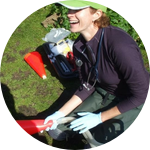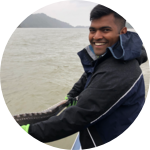About This Project
The ability of infection-causing bacteria to develop resistance to the antibiotics used to treat them (called Anti-Microbial Resistance or AMR) is a worldwide threat to human and animal health. Harbor seals are sentinels of ocean health, and we will study AMR in very young harbor seals in a wildlife hospital. Using genetic sequencing, we will identify genes that code for resistance, and evaluate how the resistance genes in individual seals change during their treatment.
Ask the Scientists
Join The DiscussionWhat is the context of this research?
Antimicrobial resistance (AMR) is a global threat to the health of humans, animals, and our shared environments. Marine mammals are sentinels of ocean health, sharing habitat and food sources with humans. AMR bacteria have already been found in harbor seals from the west coast of the US. Water moving from the land into the ocean, sewage, and fish & shellfish farms are routes of entry for antimicrobials and AMR bacteria into the ocean. Wildlife hospitals, where seals may be treated with antibiotics and then returned to the wild, provide unique opportunities to learn about AMR in the seals before, during, and after treatment. This helps us to better understand AMR in the seals, the environment, and how it may change.
What is the significance of this project?
While antimicrobial resistance is a naturally occurring process, its development has been accelerated by antibiotic use in humans and animals. We are just starting to understand the impact of AMR on the environment and wildlife populations, and how sharing pathogens among species increases the risk for all. Harbor seals are both sentinels and victims of marine AMR, and as potential sources due to the use of antimicrobials to treat them. Characterizing the AMR genes at different stages of harbor seal treatment will improve our understanding of the roles of seals in these contexts. Wildlife hospitals and rehabilitation facilities provide important opportunities to educate people about safeguarding the environments shared by all species.
What are the goals of the project?
This project will identify genes that encode for antimicrobial resistance (AMR), and evaluate how those genes change in young harbor seals during treatment and rehabilitation at a wildlife hospital. We hypothesize that:
1) the presence, prevalence, and diversity of resistance genes will increase in hospitalized harbor seals whether they are treated with antibiotics or not,
2) harbor seals treated with antibiotics will have more diverse resistance genes, and
3) more time in rehabilitation will lead to more diverse resistance genes.
Sampling hospitalized seals and using genetic sequencing will expand our understanding of how harbor seals from the Pacific Northwest are impacted by, and may impact, AMR in the ocean.
Budget
The majority of our budget request ($5000) is for the "next-generation" genetic sequencing that we will use to detect antimicrobial resistance genes from the young harbor seal samples. The remainder of the request ($1610) goes toward preparing samples for genetic sequencing. Using this powerful technique we can learn much more about the microbiome of the harbor seals, how it changes during treatment at the wildlife hospital, and detect the presence of multiple different resistance genes - information that is not available from more typical bacterial cultures and antimicrobial sensitivity tests. The results of our project will provide new information to complement previous research on this topic.
The veterinary student who is the lead for this project has received a separate research fellowship to support her participation and to provide sample collection supplies.
Endorsed by
 Project Timeline
Project Timeline
We will use samples already collected in 2019 and collect additional samples during the 2022 harbor seal rehabilitation season. We will follow the same sample collection protocol used in 2019, so that we can compare results. The sampling will take place from mid June - October of 2022. In June and July of 2022, all samples collected until that date will be analyzed. In August of 2022, we will perform bioinformatics analysis on the data and identify antimicrobial resistance genes.
Jun 01, 2022
Project Launched
Jun 03, 2022
Travel to Vancouver Aquarium Marine Mammal Rescue Center - the wildlife hospital that is the site of our research project.
Jun 10, 2022
Confirm 2022 sample collection protocol and train sampling team; begin sample collection when young harbor seals start arriving at the wildlife hospital (estimated mid-June).
Jun 15, 2022
Inventory the samples that were collected and frozen 2019 and transfer them to the Manges Laboratory, University of British Columbia, Vancouver.
Aug 08, 2022
The samples collected in 2019 will be cultured, have DNA extracted, and will be genetically sequenced. using an Illumina HiSeqX.
Meet the Team
Affiliates
Affiliates
Affiliates
Daisy Han
Hi my name is Daisy Han, and I'm a second year veterinary student at Cummings School of Veterinary Medicine at Tufts University. I have a strong interest in both public health and aquatic medicine. I'm very excited to conduct research on antimicrobial resistance in rehabilitant harbor seals this summer.
Felicia B. Nutter, DVM, PhD, Dipl. ACZM
I am a wildlife veterinarian and epidemiologist, with experience both domestically and internationally working at the intersection of human, domestic and wild animal, and ecosystem health. My research interests range from infectious disease ecology, to veterinary medical contributions to endangered species conservation, and the development of scientifically sound and humane management options for invasive species such as feral cats. I previously worked as Regional Field Veterinarian for the Mountain Gorilla Veterinary Project in Rwanda, Uganda, and the Democratic Republic of Congo; as Staff Veterinarian at the Marine Mammal Center, Sausalito, CA; and as the founding Assistant Director of Veterinary International Programs at North Carolina State University. As Director of the International Veterinary Medicine (IVM) program at the Cummings School of Veterinary Medicine, I mentor veterinary students interested in exploring research and service projects, as well as clinical rotations, in other countries.
The motivating force behind all my work is an abiding curiosity about the world and a commitment to ensure that our planet continues to sustain the astounding diversity and inextricably linked systems upon which all life depends.
Freddy Francis
I am a graduate student researcher in the lab of Dr. Amee Manges, at the School of Population and Public Health at University of British Columbia, studying antimicrobial resistance in humans and in animals. I use techniques from microbiology, immunology, and bioinformatics, with a focus on identifying resistance genes in bacteria that commonly cause disease.
Project Backers
- 10Backers
- 7%Funded
- $423Total Donations
- $42.30Average Donation



